Is Solar Worth It in 2023?
Are you fed up of expensive electricity bills and eager for an eco-friendly, sustainable option? Solar panels may be the answer! Not only do these energy sources offer a range of environmental, financial benefits as well as great ROI potential. In this comprehensive guide we’ll investigate if solar power is really worth investing in during 2023 – what to take into account before making your choice.
Key Takeaways
Evaluate solar panel investments to consider financial, environmental and ROI implications.
Financial savings and incentives can maximize return on investment.
Factors such as geographic location, roof characteristics, energy consumption patterns must be taken into account for optimal efficiency.
Evaluating Solar Panel Investments
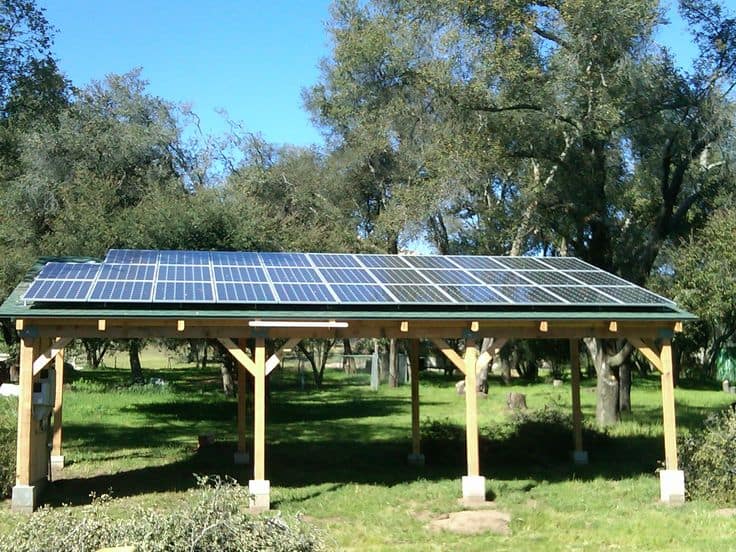
It is important to be knowledgeable of the rewards before you make a life altering choice such as investing in solar panels. In order to assist you decide if it’s right for your situation, we will analyze the environmental gains and money related savings, along with return on investment (ROI) from installing solar power systems.
We’ll investigate all facets of this renewable energy source so that an informed decision can be made regarding whether or not utilizing these Solar Panels makes sense for you.
Financial Savings and Incentives
Using solar panels to power your home can be a very rewarding and cost-effective investment. According to the Solar Energy Industries Association, households that invest in renewable energy solutions such as photovoltaic systems may see up to 95% savings on their utility bills compared with those who don’t install them. Many states offer incentives for installing these technologies – from federal tax credits right through local government programs and even from local electric companies themselves – all of which help reduce installation costs while simultaneously increasing possible returns on investments.
Choosing the most suitable financing option will maximize both your solar savings over time as well as how quickly you’ll start making some return off this venture.
Environmental Benefits
By converting to solar energy, not only can you save money but also help preserve our environment. By using this renewable source of power, we are able to reduce the reliance on fossil fuels which then decreases air pollution and greenhouse gases. Typically within 1-4 years a person can receive an “energy payback” from their investment in solar panels. Meaning that these systems will have produced enough clean electricity after this timeline period offsetting the cost used for its creation.
Generating one thousand kilowatt hours of electricity through your photovoltaic system means lowering approximately 14 hundred pounds worth carbon dioxide emissions being released into atmosphere helping greatly diminish your own individual climate footprint! Utilizing such resources shields water sources from pollutants as no foul substance is let out when obtaining energy with solar cells, making it much better for us all than traditional methods currently available!
Return on Investment (ROI)
Installing solar panels has become increasingly profitable in recent years, with the ROI providing substantial savings to homeowners. Solar technology is rapidly advancing and making them even more attractive investments that can potentially pay off within a few short years when financed correctly. Homeowners should also take into account an increased property value of up to $30,000 as another great benefit from installing these energy sources. This proves why investing in this renewable resource really does make it worth its weight – both financially and environmentally!
Factors Affecting Solar Panel Efficiency
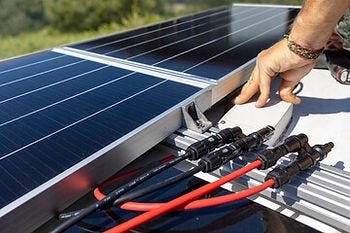
To maximize the efficiency of solar panels, it is essential to understand what influences their performance. Factors such as geographic location, roof design and energy usage all play a role in deciding which type of system would be best for your home. Considering these factors carefully can allow you to select an optimal panel system that suits your needs and optimizes its effectiveness with regard to energy consumption.
Geographic Location
When it comes to solar power systems, the amount of sun they receive is key. Locations that provide consistent sunlight and a minimal number of obstructions or shadows are optimal for installation purposes because these areas allow panels to generate higher levels electricity output.
For those in regions where there can be extreme weather events accompanied by frequent blackouts, independent power storage provides an effective option as well since this technology makes possible such autonomy from outside energy sources. Solar systems gain their own supply making them quite self-sufficient then
Roof Characteristics
The installation of solar panels requires careful consideration of the roof design, slope and orientation. An ideal set up would include installing them at a tilt between 15-40 degrees, pointing south for maximum sun exposure that translates to improved energy production capabilities. Flat roofs may necessitate additional equipment in order to adjust it correctly which can bump up labor costs. This is an investment towards making sure your system runs optimally. Keeping these factors in mind ensures you get optimal returns from your solar panel installation so they reach their full potential!
Energy Consumption Patterns
Maximizing the benefit of solar panels begins with getting an accurate picture of your household’s energy usage. Estimating how much sunlight your system will get and calculating daily consumption helps you pick out the best size for a solar panel setup for optimal savings on electricity bills. Improving home efficiency like upgrading appliances or switching to low-energy lightbulbs can take even more off those costs, making investment in a solar panel all that much more worthwhile.
Solar Panel Costs and Financing Options
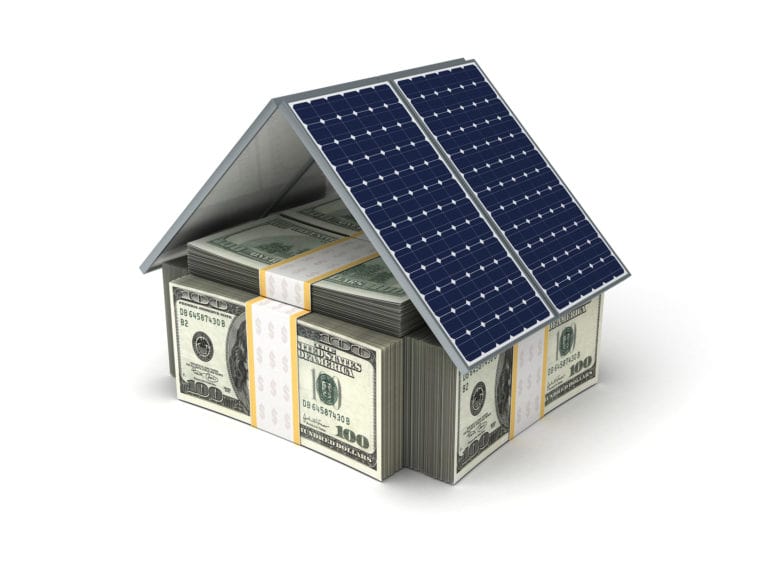
Having looked at what factors influence the efficacy of solar panel systems and their respective benefits, we can now delve into a breakdown of installation costs as well as explore various financing possibilities for homeowners wishing to invest in this clean energy source. By evaluating the different expenses that go along with setting up solar panels and familiarizing yourself with these funding options available, you will be able to make an educated decision on which path is best suited for your unique situation.
Installation Costs
The cost of solar panel installations vary by state and have steadily decreased over the last few decades. The national average for a solar system is $16,000 but it can be lower with federal tax credits applied in some cases. It’s important to keep maintenance costs, as well as installation charges such as batteries used to store energy when days are shorter or sunlight access limited into consideration too. All these factors together will help you make an informed choice on your investment in solar panels and reap its long-term benefits!
Financing Options
Installing solar panels can be done at minimal to no cost through either a solar lease or power purchase agreement (PPA). These agreements involve fixed monthly payments and potentially provide the same financial benefits as upfront payment, but may not offer access to any available incentives. Solar loans are another option for financing that allow homeowners to pay off their equipment without making an initial large investment. These plans come with interest rates of 4-7%. Evaluating all the financing options is essential in order ensure you find which one best suits your needs when it comes time to install your own personal set of solar panels.
Choosing the Right Solar Panel System

When it comes to selecting the ideal solar panel system for your home, knowledge of available costs and financing plans is essential. There are various kinds of panels accessible that can fit different energy requirements, so you’ll want to make sure that yours has an adequate size. Warranties provided with solar panels play a huge role in this decision-making process, researching these thoroughly ensures the best possible choice will be made based on all factors involved.
Types of Solar Panels
When choosing solar panels for your home, it is important to compare different technologies in order to make the best decision. Monocrystalline solar panel models are known for their higher efficiency rate – from 15% up to 24%. Polycrystalline models offer a balance between cost and efficiency while thin-film technology offers flexibility as well as reduced weight with efficiencies ranging from 11%-25.7%, at the expense of lower power output than monocrystalllines or polys. Thus, by researching all three types of solar solutions available on today’s market you can better determine which model will serve your specific energy needs most effectively!
System Size
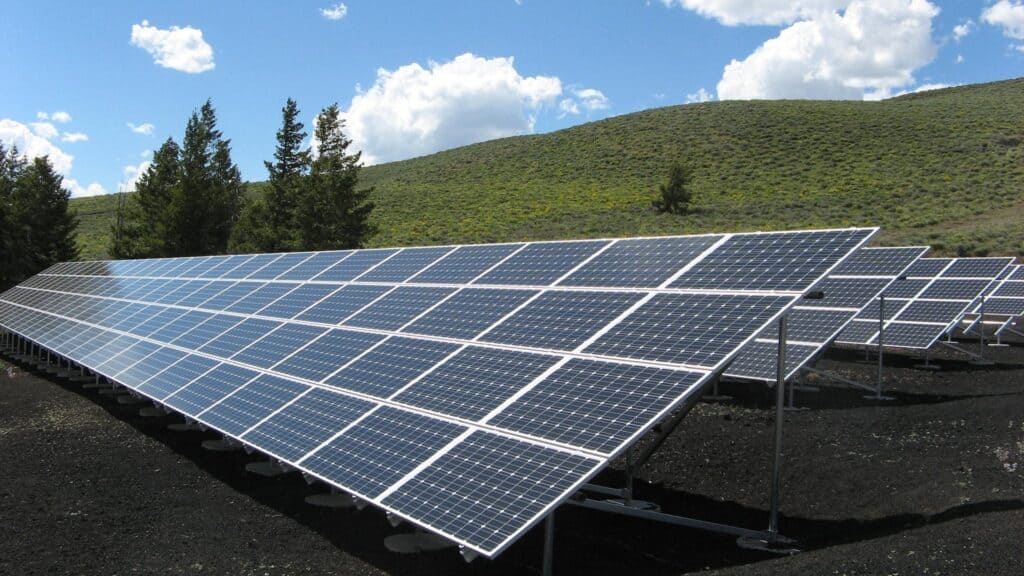
When selecting the right size of a solar panel system for your home, it is important to consider several factors such as energy use, roof space and shade availability, panel efficiency and buyback programs. On average one needs about 18 square feet of surface area per solar panel in order to maximize their investment return while also meeting individual usage requirements. Different types of panels may generate more electricity than others depending on its structure. Factoring this in helps calculate an optimal set up that fits just right with everyone’s unique situation.
Solar Panel Warranties
When selecting a solar panel system, an extended warranty is important to secure your investment. A standard coverage should cover the panels for at least 25 years and potentially include repair or replacement due to material and workmanship defects. When making comparisons between warranties take into consideration factors such as length of service agreement, what it covers, power performance guarantees provided in writing by seller/manufacturer, if the contract can be transferred with ownership changes plus examining reputation of provider issuing warrantee protection document . By carefully researching these aspects you will have increased assurance that your solar panel purchase is suitably guarded against damage which could occur over long-term period..
Solar Panel Maintenance and Lifespan
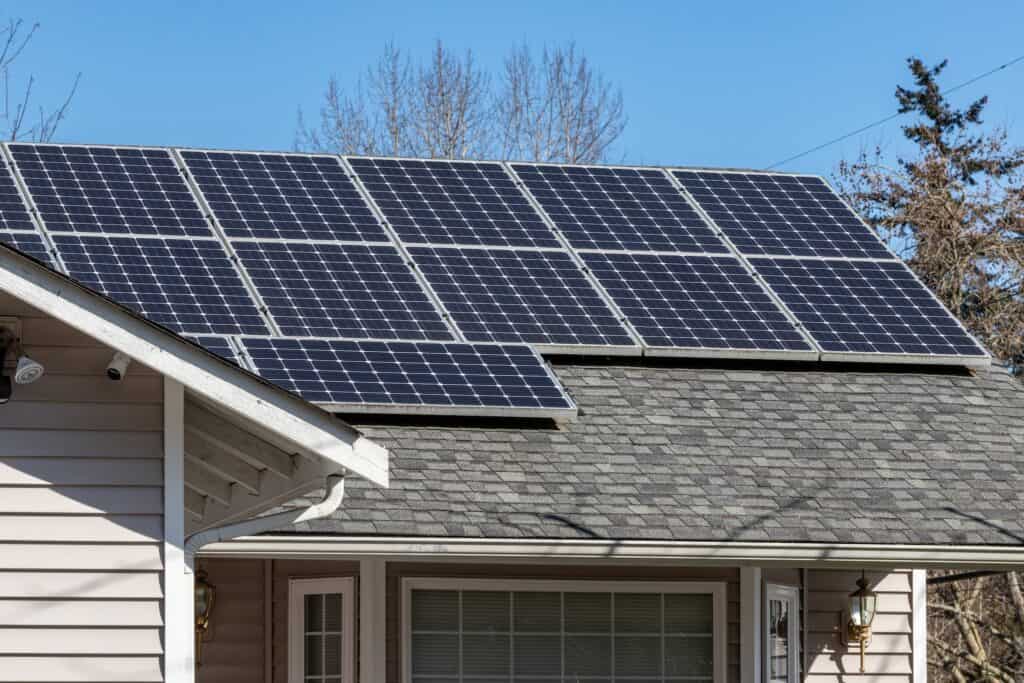
To maximize solar panel efficiency and longevity, understanding how to keep your system in top condition is key. This includes information on proper maintenance protocols as well as the average lifespan for panels. By making sure you select the right solar panel system for your home and employing consistent care techniques, you can ensure that all components of your installation are working optimally over a longer period of time.
Maintenance Tips
Solar panels should be kept up with minimal maintenance, particularly if they are mounted on a tilt so that rain can sweep away dirt and other material. It is suggested to clean the solar panel at least twice per year in order to guarantee its maximum efficiency level and stop it from deteriorating. Mild detergent mixed with water works best for washing these materials, while scrubbers or chemicals must not be used as part of their care routine.
By properly keeping up your photovoltaic systems like this you will insure top-notch performance output from them over time – leading towards increased productivity all around!
Expected Lifespan
Solar panels typically have a lifespan of 25 to 30 years, and even higher-grade ones may last as long as 50. Several elements can affect their life expectancy such as deterioration with time, weather conditions like temperature and wind strength, plus the period of solar inverters. To protect your investment in these systems you need to ensure they are well looked after and take steps that will decrease any impacts from external factors. Maintaining this upkeep should maximize how many years you get out of your solar panel setup.
Navigating Solar Incentives and Policies
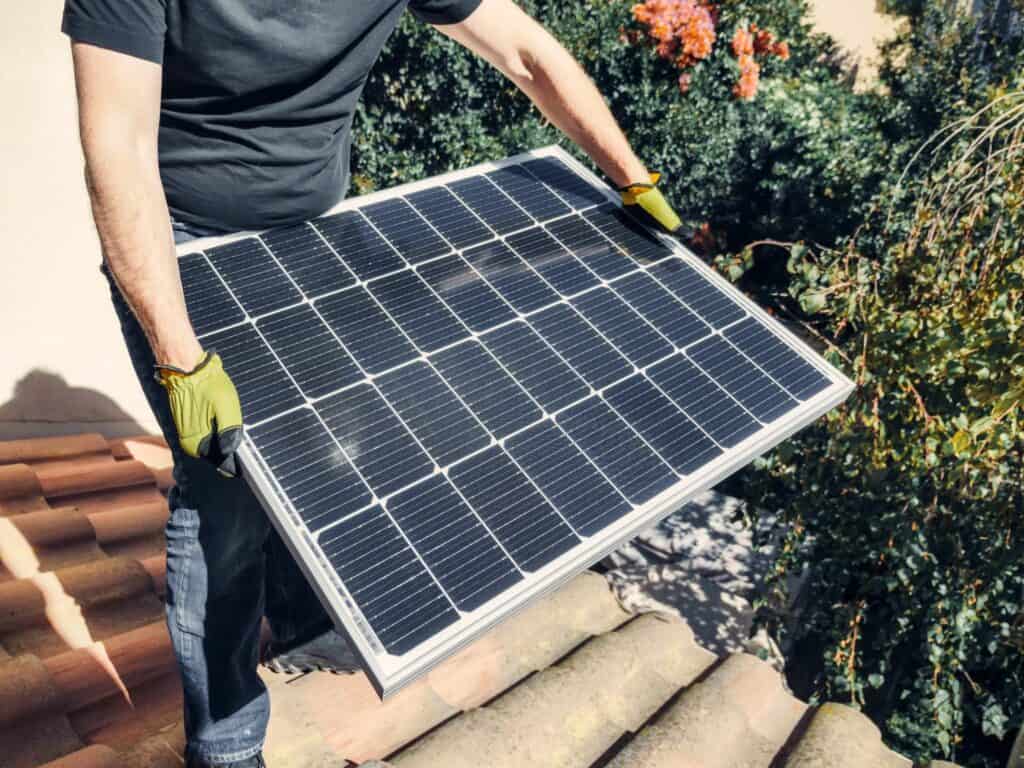
In order to maximize your solar panel investment, it’s crucial for you to comprehend and make the most of both federal and state-level solar incentives. This section will give direction on how best to take advantage of these opportunities such as the federally backed Solar Investment Tax Credit (ITC) and also various rebates or policies that can cut down costs related to a solar panel installation.
Federal Tax Credits
For homeowners looking to get a solar panel system installed, the federal solar investment tax credit (ITC) is an appealing incentive as it offers up to 26% rebate on their total expenditure. To maximize one’s savings from this program, acting quickly would be beneficial since ITC rates may decrease in coming years. Solar panels provide an excellent financial return over time and taking advantage of the ITC can help reduce your initial outlay considerably for a worthwhile long-term benefit.
State Incentives and Rebates
Installing solar panels can be made more affordable and a better investment thanks to both federal tax credits as well as state incentives such as net metering, property tax exemptions, grants. Net metering allows homeowners with solar energy systems to sell their unused electricity back to the local utility company for credit. Property tax breaks make it easier on those who have installed renewable energy resources while certain states offer monetary grants that assist in making installing solar even more attractive financially. To maximize return on your home’s installation of this clean form of power generation one should check out The Database of State Incentives for Renewables & Efficiency which shows what assistance is available at each particular locality level from various sources for people looking into solar panel investments
Real-Life Examples of Solar Panel Success
To demonstrate the advantages and accomplishments of installing solar panels, here are two case studies involving homeowners who have adopted this energy source. These examples should help to motivate those considering taking advantage of solar power – showing how you can save money, benefit the environment and raise your property value through installation.
Case Study 1
Installing solar panels can help homeowners save a substantial amount of money on their energy bills. This was seen first-hand with one homeowner who installed the system that provided an average output of 250 to 450 watts per hour when exposed to direct sunlight, resulting in annual savings totaling up $1,500. Knowing how much power such systems are capable of producing helps people make wise decisions about energy use and potential cost reduction associated with solar installations. This example shows there is great value attached to installing solar paneling for homes as it usually produces a beneficial return on investment over time due its significant saving capabilities towards electricity expenses.
Case Study 2
The installation of solar panels has proven to be a successful investment for homeowners, offering financial savings To environmental gains and an uptick in the value of their property. Not only does switching from traditional power sources to solar energy help decrease carbon emissions, but it also adds attractive curb appeal which can often result in a higher sale price should they choose put their home on the market.
This case study serves as Proof that installing solar panel systems not only offers monetary benefits, but ecological protection too, thus providing various advantages all around!
Summary
Solar panels are an excellent choice in 2023 due to their financial advantages, environmental benefits and potential return-on-investment. By being aware of the various factors that determine panel efficiency, understanding financing options available, selecting the correct system for your home, you can confidently invest in solar power knowing it is a wise decision. Maintenance and incentives aside, with solar energy there will be significant cost savings as well as decreased carbon emissions which increases property value too! So why wait? Start embracing this renewable source now by making smart choices about your future investment into solar technology today!
Frequently Asked Questions
Do you really save money with solar panels?
Solar panels offer a cost-effective energy option for homeowners as they could save up to $33,000 over their lifespan. The potential annual savings can be in the range of $1,346 with an average 6kW system producing 9,000 kWh. Thus lowering household electricity bills and saving money every month.
What is the downside of getting solar panels?
Solar panels are often costly initially and require a long-term commitment. Limited space can be problematic too, so depending on the roof type it might not even work at all. To that, if electricity prices remain low then any financial gains from them could be quite insignificant.
How much is a solar system for a 2000 sq ft house?
For a 2000 sq ft house, the price of installing a solar system typically averages around $20,000. This figure relies on the type and amount of panels needed (normally 12 to 18) for such an installation.
Is it worth buying solar now?
Solar panels can be a great investment, offering potential savings of up to $1,500 annually and increasing the value of your home. Although the installation costs may seem high at first glance, it is estimated that homeowners will recover their original expenses in 6-10 years with average annual gains reaching as much as $1,346 for 25 consecutive years afterwards.
All things considered investing in solar power now is worth considering.
How long do solar panels typically last?
Solar panels Have a durability of between two and a half to five decades, but some may last up to fifty years.






